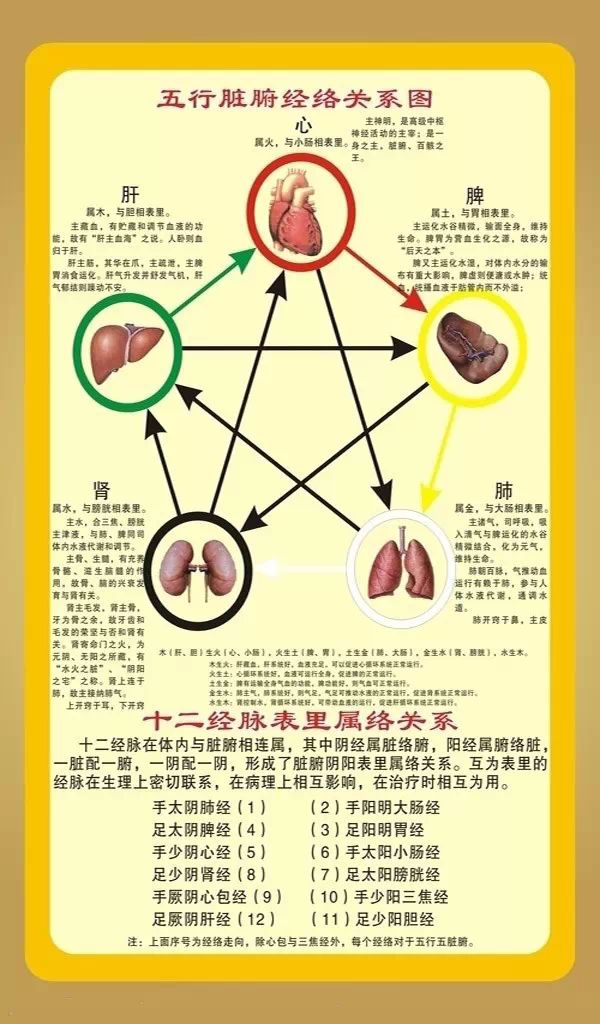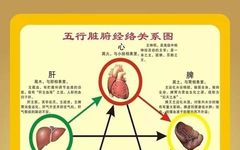The five organs of the human body, namely the liver (Gan), heart (Xin), spleen (Pi), lungs (Fei), and kidneys (Shen), are collectively referred to as the “Five Zang”. The term “Zang” historically means to store. The primary physiological functions of the Five Zang are to transform and store essence (Jing), vital energy (Qi), blood (Xue), body fluids (Jin Ye), and spirit (Shen), hence they are also known as the “Five Spirits”. Since essence, Qi, and spirit are fundamental to human life activities, the Five Zang play a crucial role in sustaining life.
Although each of the Five Zang has its specific physiological functions, their activities are not isolated. Through the connections of the meridians (Jing Luo), the Five Zang coordinate and cooperate with each other to maintain normal life activities in the body. They also influence each other in pathological changes.

【Physiological Functions of the Heart】
1.The heart governs the blood vessels, meaning it has the role of controlling blood circulation and promoting the flow of blood within the vessels, encompassing both the governance of blood and the vessels.
2.The heart governs consciousness: This refers to the heart’s role in governing the mind, also known as the heart housing the spirit.
【Physiological Characteristics of the Heart】
1.The heart is a Yang organ and governs Yang Qi: The heart is considered the sun among the Yang organs, utilizing Yang Qi.
2.The heart Qi corresponds with summer Qi: The heart is responsive to summer Qi, indicating mutual correspondence. Humans and nature are a unified whole; the seasonal changes of Yin and Yang in nature are interconnected with the functional activities of the Five Zang. The heart is most vigorous in summer, with its functions at their peak.
【Physiological Functions of the Lungs】
1.The lungs govern Qi: This refers to the lungs’ role in controlling the respiratory Qi and the overall Qi of the body.
2.The lungs govern the movement of fluids: This indicates the lungs’ role in the distribution, movement, and excretion of body fluids through their dispersing and descending functions.
3.The lungs govern regulation: This refers to the lungs assisting the heart in regulating the Qi, blood, body fluids, and the physiological functions of the organs.
4.The lungs govern dispersing and descending: “Dispersing” means to spread and diffuse, while “descending” means to clear and lower.
【Physiological Characteristics of the Lungs】
1.The lungs are the “canopy”: The term “canopy” originally referred to the cover of ancient emperors’ carriages. The lungs are considered the canopy as they are positioned highest in the body cavity, protecting the other organs and resisting external pathogens.
2.The lungs are delicate organs: This refers to the lungs’ nature of being clear, fragile, and easily susceptible to external pathogens.
3.The lung Qi corresponds with autumn Qi: The lungs are characterized by clarity and are associated with the clear and moist climate of autumn, hence lung Qi is most vigorous in autumn, which is also when lung diseases are more prevalent.
【Physiological Functions of the Spleen】
1.The spleen governs transformation and transportation: “Transformation” refers to digestion and absorption, while “transportation” refers to the distribution of nutrients. The spleen transforms food and drink into essence and distributes this essence to all organs and tissues.
2.The spleen governs blood production and regulation: The spleen has the function of producing blood and regulating its flow, ensuring that blood circulates within the vessels without overflowing.
3.The spleen governs the upward movement of clear Qi: This refers to the spleen’s ability to absorb nutrients and transport them upward to the heart, lungs, and head, where they are transformed into Qi and blood to nourish the body and maintain the relative stability of the internal organs.
【Physiological Characteristics of the Spleen】
1.The spleen thrives on upward movement: “Upward movement” implies rising and floating.
2.The spleen Qi corresponds with late summer: The spleen is most active during late summer, and its physiological functions correspond with the Yin-Yang changes of this season.
【Physiological Functions of the Liver】
1.The liver governs the smooth flow of Qi: This means the liver has the role of ensuring the smooth and unobstructed flow of Qi throughout the body, preventing stagnation and accumulation.
2.The liver stores blood: The liver has the function of storing blood, preventing bleeding, and regulating blood volume, hence it is known as the “sea of blood”.
【Physiological Characteristics of the Liver】
1.The liver prefers smooth flow: “Smooth flow” means to be open and unobstructed. The liver, being associated with wind and wood, thrives on smooth flow and dislikes stagnation.
2.The liver is a strong organ: The liver, associated with wind and wood, has a strong and vigorous nature, hence it is described as such.
3.The liver embodies Yin and utilizes Yang: In clinical treatment of liver diseases, it is advised to use gentle methods rather than harsh ones, and to nourish Yin and blood to benefit the liver or to use cooling and draining methods to suppress excessive liver Qi and Yang.
【Physiological Functions of the Kidneys】
1.The kidneys store essence: This refers to the kidneys’ role in storing and safeguarding the body’s essence.
2.The kidneys govern body fluids: Body fluids refer to the normal liquids within the body. The kidneys govern body fluids, meaning they have the function of storing essence and regulating fluid metabolism.
3.The kidneys govern the reception of Qi: This means the kidneys have the role of receiving the Qi inhaled by the lungs and regulating respiration. Although respiration is primarily governed by the lungs, the inhaled Qi must descend to the kidneys, where the kidney Qi regulates it for smooth and balanced breathing.
4.The kidneys govern the balance of Yin and Yang in the body.
【Physiological Characteristics of the Kidneys】
1.The kidneys govern storage: This refers to the kidneys’ function of securely storing the essences of the Five Zang and Six Fu organs.
2.The kidney Qi corresponds with winter Qi: The kidneys are associated with winter, the north, cold, water, and salty flavors.

